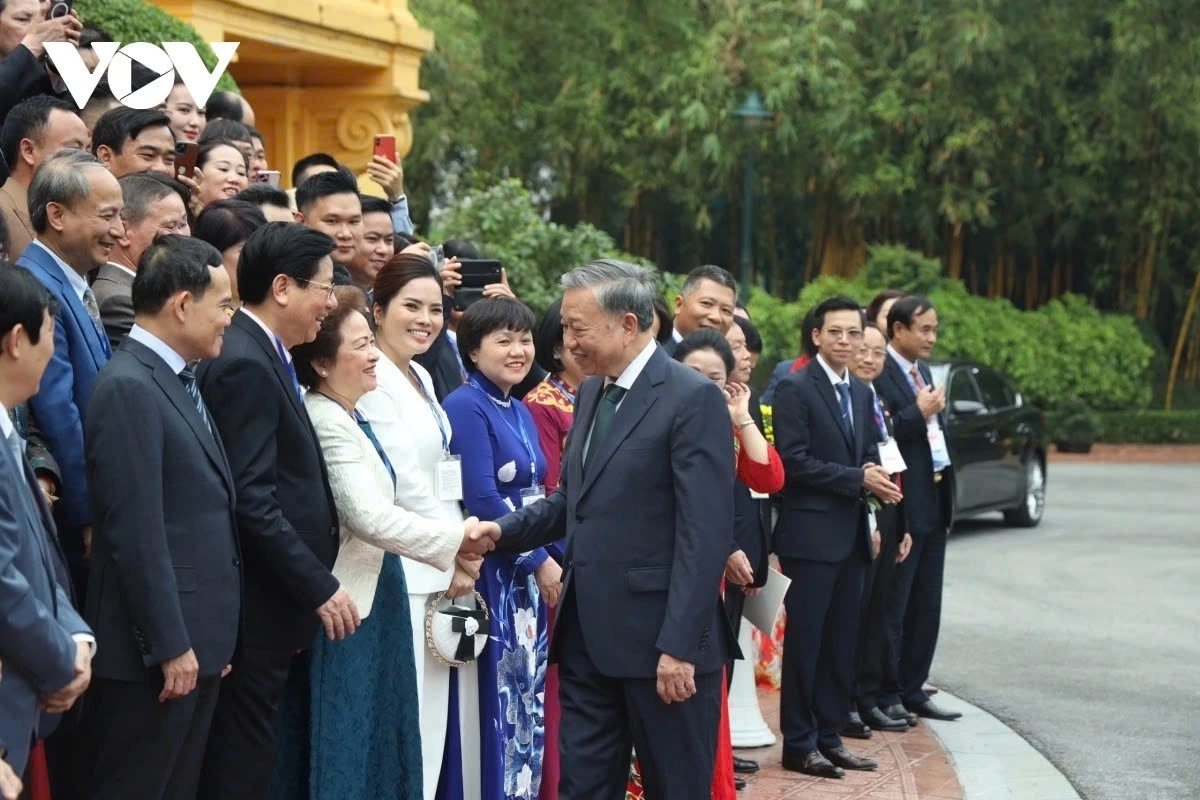An uphill task for businesses in a new era of deep integration
Society – Economy - Ngày đăng : 06:00, 18/10/2024
“Make-in-Vietnam” initiative - a game changer

After nearly 40 years of implementing the Doi Moi (Renewal) process, the Vietnamese economy has experienced continuous growth. From being a less developed country, it has now surpassed the low middle-income threshold and aims to become a high middle-income economy by 2030 and a high-income economy by 2045.
Vietnam is at a crucial stage of development, entering an era of national advancement. Prof. Tran Tho Dat, chairman of the Scientific and Training Council at the National Economics University believes that such an economic rise embodies a state where the country does not follow a traditional trajectory but instead pursues a higher trajectory.
Over the past nearly 40 years, the national economy has recorded an average growth rate of about 5.7% per year. To achieve the targets set for 2030 and 2045, it will need to sustain a growth rate of 7% per year for the next 20 years. Prof. Tran Tho Dat argues that the digital economy is a key answer to the question of “How can we advance?”
“Faced with a turning point in the journey to break through the middle-income trap and enter the Fourth Industrial Revolution, Vietnam must quickly identify that the digital economy will play a leading role in this journey, serving as a driving force for a new, rapid, and sustainable growth trajectory,” says Prof. Dat.
In this journey, he argues, State-owned enterprises play a crucial role in implementing the government’s economic development policies, especially in updating technology and enhancing competitiveness to adapt and thrive in the current business environment.
State-owned enterprises are responsible for taking the lead in digital transformation, developing national digital platforms, and transforming into digital technology enterprises, thus forming a digital product and service ecosystem around their core business areas.
“A key highlight of the national digital transformation programme is the shift from assembly and processing to creating products under the “Make in Vietnam” initiative, that comprises all processes of manufacturing, from innovation and design to production locally. The initiative aims to turn Vietnam into a center for producing and supplying high-quality industrial products in the international market, including industries such as information technology, electronics, automotive, consumer goods, food, beverages, fashion, footwear, and cosmetics. To meet the requirements of “Make in Vietnam”, State-owned enterprises need to change and improve their production processes, enhance product quality, and raise production efficiency to compete with both domestic and international private enterprises,” explains Prof. Dat.
Powerful economic groups in need

Reflecting on nearly 40 years of reform, Assoc. Prof. & Dr. Pham Thi Hong Diep from National Economics University and Dr. Nguyen Thi Nhung from Hanoi Pedagogical University emphasize that the Party has continuously refined and developed guidelines and views on the development of the private economy. Currently, the private economy is recognized as an important component of the socialist-oriented market economy.
To develop a strong private economy that meets expectations, both academics believe that in the context of globalization and international integration, encouraging the formation of powerful economic groups to enhance global competitiveness is essential.
In their views, during the process of international economic integration, Vietnamese enterprises are increasingly engaging in global value chains. The private economy has opportunities for growth due to the removal of tariff barriers. However, as latecomers, Vietnamese private enterprises, with limited capital, will face significant challenges in their relations with the international business community when deeply engaging in the global market.
Therefore, they suggest that Vietnam form large private groups to create significant momentum and enhance the competitiveness of local enterprises. They argue that leading private corporations in industrialized and developed countries always play a pivotal role in transforming their economies into global powerhouses.
However, the academics point out that encouraging the formation of multi-ownership private economic groups must be accompanied by measures to combat ‘Group Interests’ that create inequalities among businesses, leading to cronyism that distorts the market.
Additionally, the private economy plays a crucial role in leveraging the achievements of the Fourth Industrial Revolution to create a boost in technological advancement and increase labour productivity. Therefore, it is essential to continue facilitating a favourable business environment, ensuring equality among different economic sectors.
Both academics hold that in a modern market economy, the state economy is a tool for macroeconomic regulation, so its existence is objective. In developed countries, the state economy accounts for only 10-15% of GDP but can still fulfill its mission. The state economy should focus on key, essential sectors, important regions, and national defense - areas where other economic sectors do not invest.
In practice, private enterprises in Vietnam have successfully participated in many areas that previously only the state economy could manage, such as airport and seaport construction and automobile manufacturing. Therefore, the Party should continue promoting the development of the private economy to facilitate strong growth across most sectors, especially in key economic areas, enabling Vietnam to reach out to the wider world, the two academics suggest.
Better institutions a must

Complex and unpredictable international developments require Vietnam to strengthen its strategic autonomy, effectively implement an independent and self-reliant foreign policy, and leverage economic diplomacy to mitigate risks while effectively seizing opportunities arising from the shift in the global supply chain.
Domestically, after nearly 40 years of reform, the country’s strength and influence are increasingly robust. However, the economy continues to face numerous difficulties and challenges, bringing to bear pressure on the process of developing a socialist-oriented market economy.
Perfecting institutions to ensure the independence and autonomy of the economy and enhance the effectiveness of international economic integration is one of the strategic solutions to the development of Vietnam’s socialist-oriented market economy in the new context, according to Prof. Dr. Nguyen Quang Thuan from the Central Theory Council.
“It’s imperative to proactively form institutions and policies to encourage the diversification of export and import markets; actively select and improve the quality of attracting and managing foreign investment sources to best meet the country’s development needs; and closely manage and effectively utilize foreign loans from international organizations. It’s also necessary to reasonably use appropriate technical barriers to protect the domestic market; actively and responsibly participate in building economic, trade, and investment institutions at both the regional and global levels; and adopt measures to prevent and mitigate negative external impacts on the domestic economy,” he suggests.
Prof. Dr. Thuan stresses the need to remove bottlenecks and address key issues that hinder the development of the domestic market economy; improve the quality and effectiveness of national governance; and formulate and enforce laws, strategies, planning, and programs. The process should involve creating institutions that promote cooperation and business linkages between economic sectors, establishing sustainable production and value chains, and deeply integrating into global supply chains.
Furthermore, Prof. Dr. Thuan underscores the importance of enhancing consensus on developing a socialist-oriented market economy in Vietnam at all levels, along with refining institutions and developing a complete and cohesive market structure to unlock and leverage development resources.
